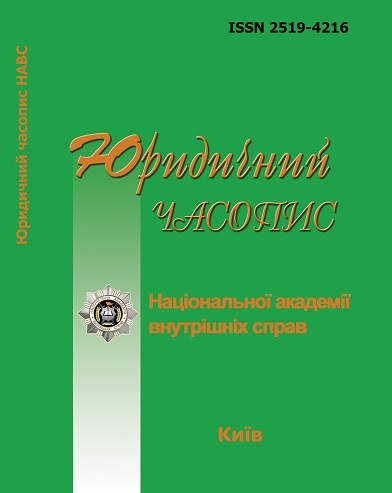The Search as a Tool of Obtaining Evidence in a Criminal Proceeding: the Separate Innovations of the Current Criminal Procedural Code of Ukraine
Abstract
The article covers the main legislative innovations of the current Criminal Procedure Code of Ukraine which relates with the procedural procedure for obtaining evidence by conducting a search in criminal proceedings. The introductions were adopted with the Law of Ukraine «About Amendments to Certain Legislative Acts which concerned with enforcement of the rights of participants in criminal proceedings and other persons by law enforcement bodies during the pre-trial investigation» of November 16, 2017, No. 2213-VIII. Their weaknesses are emphasized and the own ways of optimizing the provisions of the current Criminal Procedure Code of Ukraine to ensure the effectiveness of the application of such kind of obtaining evidence in criminal proceedings as a search are offered in the article.
It is proved that the provisions of Part 3 of Art. 236 of the Criminal Procedure Code of Ukraine should be clarified and worded as follows: «The investigator, the prosecutor shall not have the right to prohibit the search participants from using the legal assistance of a lawyer, lawyer or representative. The investigator, the prosecutor is obliged to allow such a defense counsel, lawyer or representative to search at any stage of its conduct».
It is specified that the mandatory fixation of the order of conducting a search by means of audio and video should be extended to cases of conducting a search without the order of the investigating judge in accordance with the procedure provided for in Part 3 of Art. 233 Criminal Procedure Code of Ukraine.
It is concluded that an audio or video of a search is not a certain type of evidence in a criminal proceeding (document), since it can not have an independent procedural meaning without an appropriate search protocol, but is an annex to this protocol. Only in their inseparable unity, they will constitute the content of evidence in a criminal proceeding. It is noted that the establishment or refutation of the fact that a defense counsel or advocate is not allowed to participate in a search of a dwelling or other property of a person, a search of a place, a search of a person must be relied on the part of the criminal proceedings, the lawyer and the victim during the pre-trial investigation or trial.
Downloads
Abstract views: 90 PDF Downloads: 221
Copyright (c) 2018 Law Magazine of the National Academy of Internal Affairs

This work is licensed under a Creative Commons Attribution-NonCommercial-NoDerivatives 4.0 International License.
- Authors reserve the right to authorship of their own work and transfer to the magazine the right of the first publication of this work under the terms of the Creative Commons Attribution License, which allows other persons to freely distribute published work with mandatory reference to authors of the original work and the first publication of an article in this magazine.
- Authors have the right to enter into separate additional agreements on non-exclusive dissemination of the work in the form in which it was published in the journal (for example, to post an article in the institution's repository or to publish as part of a monograph), provided that the link to the first publication of the work in this journal is maintained.
- The journal's policy allows and encourages the posting of articles by authors on the Internet (for example, in electronic storehouses of institutions or on personal websites), both before the submission of this manuscript to the editorial office and during its editorial processing, as this contributes to the creation of a productive scientific discussion and positively affects the efficiency and dynamics of citing the published work.




